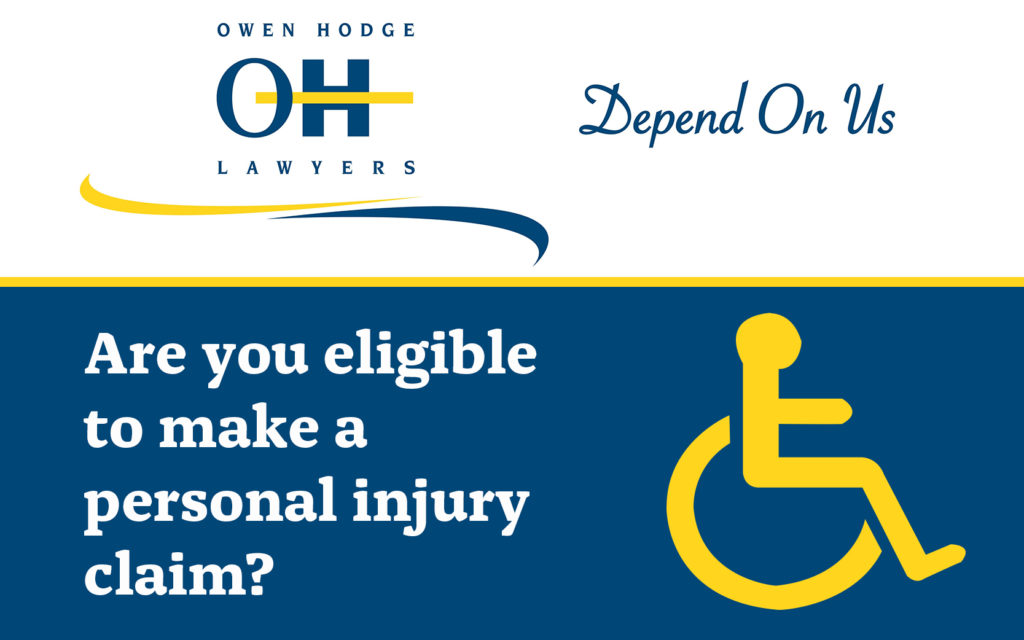If you’re considering claiming for personal injury or you’re looking for NSW compensation lawyers, this informative article is a good place to start.
Blog Contents:
- Types of personal injury claims
- Proving negligence
- Time limits on personal injury claims
- Information needed for a personal injury claim

Types of personal injury claims
Car accidents in NSW are the most common personal injury claims. These are also known as motor vehicle accident claims. However, there are other personal injury claims that allow for an injured person to recover for their losses.
Claiming for personal injury comes in various forms. Some of the most common types of claims are:
- Workplace injuries and workers compensation
- Medical negligence
- Occupiers or public liability injuries
- Product liability
- Crime victim compensation
- Work oriented discrimination
- Sexual harassment
- Professional negligence
All personal injury claims made in NSW are governed by the Civil Liability Act 2002. Within this body of law, the legal elements required to make a personal injury claim and the time frame within which such a claim needs to be made, is defined.
Claiming for personal injury: 4 things to bear in mind
To make a successful personal injury claim, a number of elements must be considered. However, the crux of the matter when claiming for personal injury is usually proving that the party at fault was negligent.
1. Proving duty of care
In proving negligence, the injured party must be able to prove that the person who caused the harm had a duty “of care” (to be careful) that they did not meet. However, the court could determine that the proper care was taken, and instead, the injured party was careless.
To make this determination the court can look to whether the harm that occurred could have been foreseen by the perpetrator. The more likely that the harm could have been foreseen from a lack of care, the more likely the court will find the perpetrator negligent. The court will also review the likelihood of the harm occurring, and how much effort the defendant would have had to put into reducing the risk of the harm.
2. Cause of the harm
The second element of proving negligence is to determine if the negligence caused the harm. If the negligence caused the harm, it is more likely the court will find in favour of the injured party.
3. Assumption of risk
Finally, the court will review if the injured party assumed the risk and therefore has no claim. A risk is considered assumed by the injured party if it was one that was known or could reasonably have been known or expected. If the court finds that the injured person assumed the risk of the event or activity, the defendant will not be found liable for the personal injury.
4. Time limit
The final element to being successful in your claim is to be sure that you file your claim within the legal time frame to do so. The time limits to make personal injury claims are different depending upon the type of claim you are making.
If you are claiming for personal injury due to:

1. Motor Vehicle Accident
a. You will have 28 days to file a report with the local police
b. You will have 6 months to file a claim form with the CTP insurance company of the vehicle that caused the accident
2. Other Claims
a. You will have 3 years from the date of the injury or from the time the injury was discoverable to lodge a claim
b. You will have 12 years from when the act caused the injury, overall
It is important to remember that the 3-year and 12-year time frames can be reviewed by the court and some exceptions may apply.
Regardless of the nature of your claim, it is important that you take steps to prepare for proving your case.
Important details to collect
- The name and address of the person you were involved in the accident with and the address of the establishment it occurred at.
- The insurance information of the person who caused the injury.
- Pictures of the accident (if possible).
- Your own insurers should be contacted as soon as possible.
- A written account of the details of the accident.
- Any reports that were filed with police, local authorities, safety inspectors, insurance companies etc.
- Medical reports of the injuries you sustained immediately or over the course of time.
- The types of medical treatment you are engaged in, including medical, psychological, and rehabilitation treatments.
- Medications you are taking that were prescribed as a result of the injury
- Hospital or emergency room visits or stays.
- The names and addresses of witnesses.
- The changes in your daily personal and work life, connected to the accident.
- Receipts for any connected costs.
To protect any claim you might have for personal injury, it is highly recommended that you seek the advice of personal injury lawyers immediately after being injured. You should also speak with your insurance company and seek medical attention.
Only a solicitor with the proper experience can guide you in a manner that will protect your rights to the fullest and claim the compensation you deserve. In the event that you find yourself in need of such assistance, please contact the law offices of Owen Hodge Lawyers.
At Owen Hodge, we are always happy to assist clients in understanding the full ramifications of any and all of your legal needs. Please feel free to call our law firm at your earliest convenience to schedule a consultation at 1800 770 780.
At Owen Hodge Lawyers, we always strive to provide you with the best legal advice and guidance – no matter your issue. We specialise in a range of law matters including personal injury law, and have a blog that offers in-depth and comprehensive articles. Learn about pill testing pros and cons and more on the Owen Hodge blog today.
